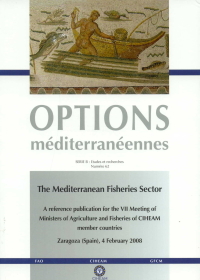| Article précédent | p. 155-162 | Article suivant |
Concise report on fishing issues in the countries of the southern Mediterranean and on research and management requirements in the sector
In the field of marine biodiversity, the southern shore of the Mediterranean hosts a variety of marine resources of commercial interest. The exploitation of these resources is concentrated mainly in the coastal zone, where juveniles of several species are found, and is characterised by the sometimes troubled coexistence between the artisanal and industrial sectors. The results of the research work carried out in the North African region show that most of the marine resources are either fully exploited or already at an advanced stage of overexploitation. Concerning fisheries research, the information available on certain aspects of these resources is often missing, particularly in population dynamics and the biological cycle; this lack of information has a negative influence on the quality of stock assessments and consequently on the measures taken in fisheries management. In order to achieve the objectives of resource conservation and sustainable management, a better coordination of research is needed, to be achieved through a close integration of the regional and subregional research networks and the establishment of integrated management plans together with accompanying measures, such as the creation of protected marine areas, and the strengthening of North and South Mediterranean cooperation but also between the southern regions themselves.
Dans le domaine de la biodiversité marine, la rive sud de la Méditerranée héberge des ressources marines d'intérêt commercial très variées. L'exploitation de ces ressources, confinée notamment au niveau de la zone côtière, lieu de concentration des juvéniles de plusieurs espèces, se caractérise par la coexistence parfois conflictuelle d'un secteur artisanal et d'un secteur industriel. Des résultats des travaux de recherche menés dans la région nord-africaine, il ressort que la plupart des ressources marines exploitées sont soit dans un état de pleine exploitation, ou déjà dans une situation de surexploitation avancée. En matière de recherche halieutique, il importe de souligner que les informations disponibles sur ces ressources comportent de nombreuses lacunes notamment en matière de dynamique et de cycles biologiques des ressources ; ces lacunes influent négativement sur la qualité de l'évaluation des stocks et par conséquent sur les mesures de gestion des pêches. Pour la réalisation de ces objectifs de conservation et de gestion durable des ressources, il importe de mettre en oeuvre une meilleure coordination de la recherche et ce, à travers une intégration étroite dans les réseaux de recherche régionaux et sous-régionaux ainsi que l'instauration de plans de gestion intégrée des ressources avec la mise en oeuvre de mesures d'accompagnement telles la création d'aires marines protégées, ainsi que le renforcement de la coopération nord-sud et sud-sud.
- [ Afficher ]
- [ Télécharger ]
- [ Exporter la citation ]
Vous pouvez télécharger la citation au format :
- [ Imprimer ]
-
Mots-clés
GESTION DES PECHES, MER MEDITERRANEE, RECHERCHE, RESSOURCE HALIEUTIQUE, SURPECHE, ZONE COTIERECiter cet article
Berraho A. Concise report on fishing issues in the countries of the southern Mediterranean and on research and management requirements in the sector. In : Basurco B. (ed.). The Mediterranean fisheries sector. A reference publication for the VII meeting of Ministers of agriculture and fisheries of CIHEAM member countries (Zaragoza, Spain, 4 february 2008). Zaragoza : CIHEAM / FAO / GFCM, 2008. p. 155-162. (Options Méditerranéennes : Série B. Etudes et Recherches; n. 62). 7. Meeting of Ministers of Agriculture and Fisheries of CIHEAM Member Countries, 2008/02/04, Zaragoza (Spain). http://om.ciheam.org/om/pdf/b62/00800745.pdf



